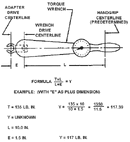Juank
Registered
Which torque wrench for all scuba torque needs. Say Regs and cylinder valves. Which one is the most cost effective?
Thanks
Thanks
Last edited:
Welcome to ScubaBoard, the world's largest scuba diving community. Registration is not required to read the forums, but we encourage you to join. Joining has its benefits and enables you to participate in the discussions.
Benefits of registering include
I use the same. I like the 250 inch pound upper limit as turret bolts require 175 and DIN connections 120.
Having worked as a mechanic all my life I both with and without using torque wrenches I feel they are most needed in situation of multiple fasteners on a single assembly such as an engine cylinder head. or wheel. If I use a wrench sized for the fastener and don't pull to the point of straining most times I will be within the torque specification. A 6" long wrench on a 3/8" hose fitting will get you in the ball park, With a 12" wrench it will be too tight. Adjustable wrenches generally won't work because a big wrench can be adjusted to fit a small fastener. Stick with a set of combination wrenches sized to the size fastener. Get the feel by comparing the difference between using a torque wrench and a regular wrench on the same fastener.
The problem with torque wrenches is you need special crow foot wrenches if you can't use a socket on the fastener such as a hose. More failures happen because of over tightening a fastener than under tightening one.
A good beam type torque wrench never need recalibration and is the most accurate. I don't particularly trust cheap micrometer type pull until they click wrenches and even the good ones need to be checked for accuracy regularly.
Scuba manufactures specify torque wrenches more to keep shop gorillas from over tightening and stressing fasteners to the point of possible failure then the possibility of something coming loose.
Turret bolts are a prime example, if it is a sudden failure of the turret bolt it was over stressed because someone was afraid of it getting loose.


